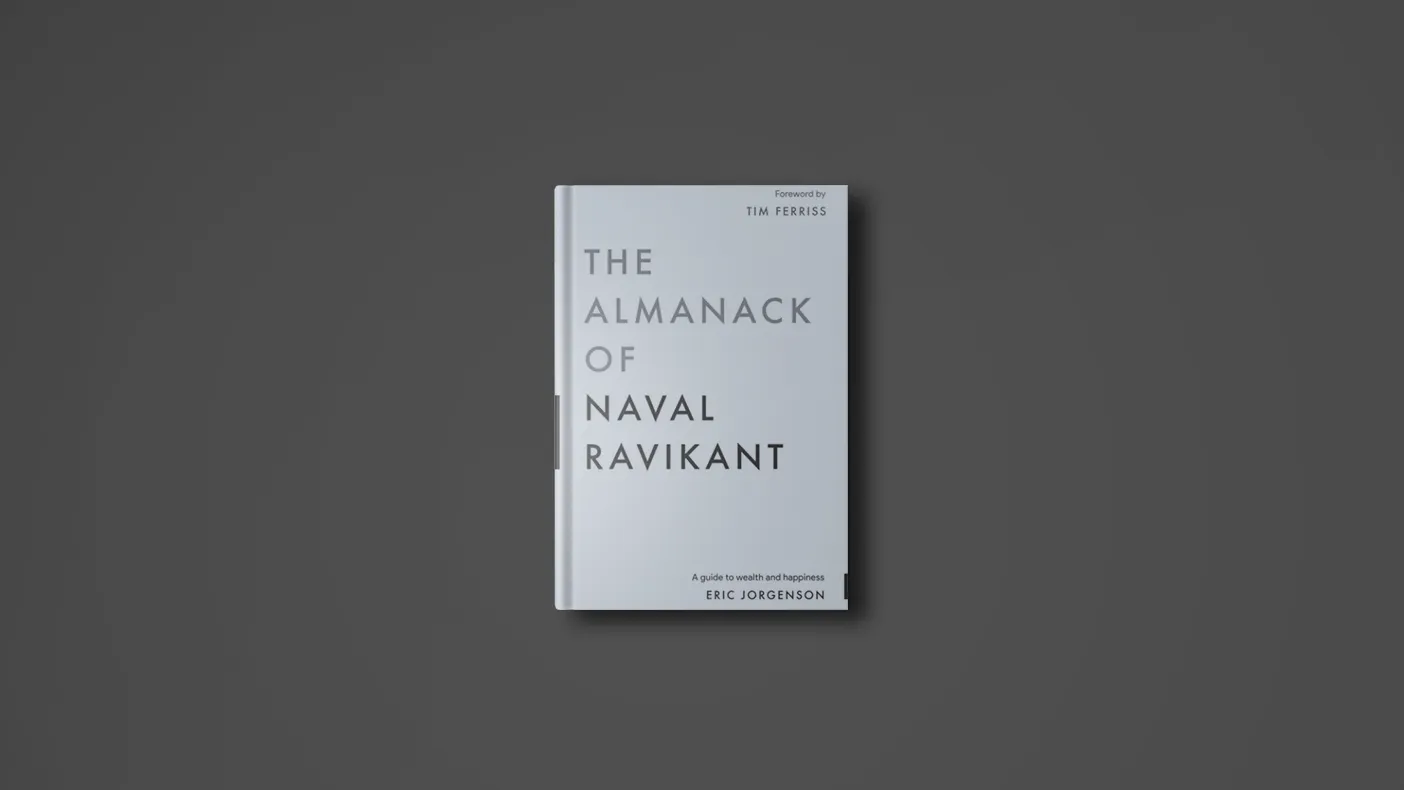In 2020, one of the books I was very interested in was the Almanack of Naval Ravikant; because of my own laziness, I could read it at the beginning of 2021. I need to be more courageous to step up and read the books that catch my interest. Because after I read it, I said that I should read this book as it came out, not after a couple of months.
In this article, I will first talk briefly about Naval Ravikant, then talk about the book, and finally the points I find important in the book.
Naval Ravikant
Of course, I will not talk about the life of Naval Ravikant here. I will only give brief information. He is an entrepreneur and investor. He started his business life as an entrepreneur, and with the money he got, he invested in many successful companies to grow his fortune. If you have an interest in entrepreneurship, you may know the AngelList. He is one of the founders of that site. My reason for referring to Naval Ravikant was not his success but for his ideas and thoughts. After the tweet series “How To Be Rich (Without Getting Lucky)” written by him in 2018, my admiration grew, and I started to think and weigh his ideas within myself. Adding his views on life to his investor and entrepreneur features, he became a much more interesting role model. Making a role model here is not like copying him, but being a role model about being more disciplined and productive. Anyway, when we look at the book notes, we will also see his ideas about copying others.
I need to share his words on happiness, life, health, and the ideas he shared, and of course, including adding my own comments. In fact, the Almanack of Naval Ravikant is a book that makes it easy for me to do just that.
Almanack of Naval Ravikant (Almanac of Naval Ravikant)
First of all, this is not a book we used to read. It is definitely not the kind of book you want to sit down and read on one go. Because he examines the tweets he posted and the words he spoke more deeply in the book.
First of all, it starts with the tweeting series I mentioned above based on being rich and shares many of his ideas about both work life and our personal self. Frankly, it is a book that I always want to have in my library because it is a kind of book that I will open and read when I do not know what to do. Without further ado, I would like to mention the words I find inspiring in the book with my own ideas.
As I said before, we start the book with the How to Become Rich tweet series, but Naval Ravikant never directly mentions money when talking about wealth. He talks more about the things that lay the groundwork for being rich and the road to building wealth. I want to emphasize that what we call wealth here is monetary wealth and wealth, including everything material and spiritual.
If you have nothing in your life, but you have at least one person that loves you unconditionally, it’ll do wonders for your self-esteem.
I do not think it is an issue open to discussion here. In fact, what is more, important than material wealth and high-level life is that having someone who loves us. I think that person will always instill in you the feeling that you can always start over and succeed.
Making money is not a thing you do — it’s a skill you learn.
Getting rich is about knowing what to do, who to do it with, and when to do it. It is much more about understanding than purely hard work.
You’re not going to get rich renting out your time. You must own equity — a piece of a business — to gain your financial freedom.
I want to examine the three quotes in common here. First of all, I also think that making money is a skill and every person learns how to make money using their own abilities. But in other words, there are some clues that many of us miss, ignore, or do not want to believe. Especially in our culture, the concepts of working hard and earning money easily are used very interestingly and are often misused. Naval Ravikant says that if you are doing a job at the right place and at the right time, you are on a path to wealth both materially and spiritually. And he says that we cannot get rich by renting our time, that we need to use the money we earn by renting our time in certain ways. Her suggestion here is, of course, to invest in companies you believe in. Given this, what a reverse and different path from our parents’ point of view.
Play iterated games. All the returns in life, whether in wealth, relationships, or knowledge, come from compound interest.
Learn to sell. Learn to build. If you can do both, you will be unstoppable.
I saw the concept of iterated games in a tweet by Naval Ravikant long before the book. For a very long time, I thought, weighed, and even judged this idea. However, he states that if you have wealth (richness, relationships, knowledge) based on certain foundations, you will earn much more in the long run. Of course, you have to learn to sell and create something to grow with them. He believes that when you combine these two, you will be on a different level.

Specific knowledge is found by pursuing your genuine curiosity and passion rather than whatever is hot right now.
Specific knowledge is often highly technical or creative. It cannot be outsourced or automated.
Reading is faster than listening. Doing is faster than watching.
Become the best in the world at what you do. Keep redefining what you do until this is true.
It is necessary to open a little bit of specific information here. This is mostly “personal” information that you have learned by following your interests and curiosities and created with the information you have learned in the past. Generally difficult to copy, it is created by combining different disciplines. This is exactly what Naval Ravikant is trying to explain. For specific knowledge to be formed, it is always necessary to learn new things and apply them in our lives. He says that reading is quicker than listening, and doing is faster than watching someone. The more you deepen this specific knowledge, and the better you apply it, there is no reason why you should not be the best in that field in the world. However, the important point here, and the point he has already pointed out, is: redefine what you do until it’s the best, iterate it.
Specific knowledge is found much more by pursuing your innate talents, your genuine curiosity, and your passion. It’s not by going to school for whatever is the hottest job; it’s not by going into whatever field investors say is the hottest.
Basically, when you’re competing with people, it’s because you’re copying them. It’s because you’re trying to do the same thing. But every human is different. Don’t copy.
The best jobs are neither decreed nor degreed. They are creative expressions of continuous learners in free markets.
The most important skill for getting rich is becoming a perpetual learner. You have to know how to learn anything you want to learn.
Follow your intellectual curiosity more than whatever is “hot” right now. If your curiosity ever leads you to a place where society eventually wants to go, you’ll get paid extremely well.
I think Naval Ravikant has very thought-provoking ideas about using specific information. There is a point I want to open about his first quote. I am aware that private knowledge cannot be found by going to schools and doing what investors call the hottest. Still, I think such environments are also very effective in seeing new things, learning, and taking steps to bring you closer to your passion. I also unconditionally agree with the issue of not copying. We are not the same, we can be very similar, but we are not the same. No matter how hard we try, we cannot give the same output; even a word we use will taste different.
I’m not sure if I should comment on whether the road to wealth is through learning, at least for material wealth. However, I do not doubt that the more you learn, the better equipped you become, the more aware person. I want to add one more point here; open-mindedness is a feature that will really get you through a few levels and increase your learning and understanding.
What he refers to as hot actually means what is popular at the moment and brings high returns. But what happens when that popularity ends? This is where Naval Ravikant says it makes more sense to take a different path, using your specific knowledge, doing a more niche job rather than following the popular.
If you get good at managing capital, you can manage more and more capital much more easily than you can manage more and more people.
Don’t gamble everything on one go. Instead, take rationally optimistic bets with big upsides.
I don’t know how much I should comment on money, finance because I’m still trying to understand and learn how money works, but there is nothing wrong or problematic in these words.

Being at the extreme in your art is very important in the age of leverage.
The business worlds has many people playing zero sum games and a few playing positive sum games searching for each other in the crowd.
The closer you want to get to me, the better your values have to be.
Tell everyone. Start now. It doesn’t have to be blunt. Charisma is the ability to project confidence and love at the same time. It’s almost always possible to be honest and positive.
What are the most efficient ways to build new mental models? Read a lot — just read
He says education is important over and over again. However, he says that, contrary to common knowledge, education should be taught not only in schools but also in our personal lives. Read, think, learn, increase your value. More importantly, play this knowledge in positive-sum games, not zero-sum games.
The three big ones in life are wealth, health, and happiness. We pursue them in that order, but their importance is reverse.
If you could just sit for thirty minutes and be happy, you are successful.
The reality is life is single-player game. You’re born alone. You’re going to die alone. All of your interpretations are alone.
Don’t hang around people who constantly engage in conflict. I’m not interested in anything unsustainable or even hard to sustain, including diffucult relationships.
Self-discipline is a bridge to a new self-image.
You’re going to die one day, and none of this is going to matter. So enjoy yourself. Do something positive. Project some love. Make someone happy. Laught a little bit. Appreciate the moment. And do your work.
Health, love, and your mission, in that order. Nothing else matters.
What makes Naval Ravikant different for me from everyone else is that besides being an entrepreneur and investor, he takes care of himself, happiness, and health and improves himself for them. The fact that he shares these with us is crucial. These last quotes were mentioned at the end of the book, which I enjoyed the most. What really matters in life, except wealth, health, and happiness? I repeat, but I see the wealth he mentioned here not only monetary wealth but also material and spiritual. The relationships you have, your colleagues, a quality of life that makes you happy, and more. However, what I thought about the most was the order of importance for me. The health was in the first place in my importance. Then there was happiness and wealth. I am not discussing the place of wealth, but I really go back and forth between happiness and health.
In general, it was a book that I both enjoyed, questioned many things, and learned a lot. As I said at the beginning of the article, it is a book that I would like to open and read at any moment. It has been one of the most impressive books for me to come out in 2020.
If I could make you wonder about the book and even thought about reading it for a moment, how happy I am. I believe it is a book where every person can learn something, find something to question.





![[object Object]](/_next/static/media/bugra-dark.8a564d9e.svg)